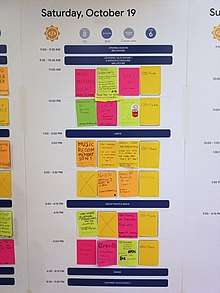Unconference
An unconference is a participant-driven meeting. The term "unconference" has been applied, or self-applied, to a wide range of gatherings that try to avoid hierarchical aspects of a conventional conference, such as sponsored presentations and top-down organization.[1][2]

History
According to Tim O'Reilly, the first unconference (reducing the usual emphasis on formal speeches and emphasizing informal connections instead) was organized by Alexander von Humboldt in 1828.[3]
The term "unconference" first appeared in an announcement for the annual XML developers conference in 1998.[4]
Unconferences often use variations on Open Space Technology, the format/method developed by Harrison Owen in 1985. Owen's 1993 book Open Space Technology: a User's Guide discussed many of the techniques now associated with unconferences, although his book does not use that term.
The term was used by Lenn Pryor when discussing BloggerCon (a series of conferences organized by Dave Winer and first held October 4–5, 2003 at Harvard's Berkman Center for Internet & Society.)[5]
Sarah Winge, the organizer (with Tim O'Reilly) of Foo Camp, an early unconference, drew on her experience of open space and conversations with Harrison Owen to develop the format.[6] The first Foo Camp happened October 10–12, 2003, in Sebastopol, California. In 2005 some of the attendees from previous years decided to produce their own "Bar" Camp. These three events, BloggerCon, Foo Camp and BarCamp helped to popularize the term "unconference".[7]
Format
Typically at an unconference, the agenda is created by the attendees at the beginning of the meeting. Anyone who wants to initiate a discussion on a topic can claim a time and a space. Some unconference sessions (for example at FooCamp or BarCamp) are led by the participant who suggested its topic; other unconference sessions are basically open discussions of the session topic.
An "unconference" is particularly useful when participants generally have a high level of expertise or knowledge in the field the conference convenes to discuss.
Facilitation styles
An unconference can be conducted using a number of facilitation styles. Some of these are:
- Birds of a feather
- Dotmocracy
- Fishbowl
- Ignite
- Knowledge café
- Lightning talks
- Open Space Technology
- PechaKucha
- Speed geeking
- World café (conversation)
Notable unconferences
| Wikimedia Commons has media related to Unconferences. |
References
- Atkinson, Cliff. The Backchannel: How Audiences are Using Twitter and Social Media and Changing Presentations Forever. New Riders. p. 85. ISBN 9780321659620.
The term unconference refers to any loosely structured gathering that is distinguished from a formally organized conference (such as BloggerCon, an early unconference for bloggers).
- Craig, Kathleen (June 6, 2006). "Why "unconferences" are fun conferences". Business 2.0 Magazine. Archived from the original on May 21, 2008.
But that changed in February when O'Grady arrived at Mashup Camp, an exclusive two-day gathering of Silicon Valley geeks billed as an "unconference." Attendance was free but limited to the first 300 people to sign up on the Mashup Camp wiki... Though the event had sponsors like Sun Microsystems , its agenda was created on the fly by attendees. As chaotic as that sounds, it sparked a ton of ideas.
- O'Reilly, Tim (March 8, 2018). "The True Inventor of the Unconference". LinkedIn. Retrieved July 18, 2018.
In September 1828 he invited hundreds of scientists from across Germany and Europe to attend a conference in Berlin. Unlike previous such meetings at which scientists had endlessly presented papers about their own work, Humboldt put together a very different programme...Humboldt encouraged scientists to gather in small groups and across disciplines. He connected the visiting scientists on a more personal level, ensuring that they forged friendships that would foster close networks. He envisaged an interdisciplinary brotherhood of scientists who would exchange and share knowledge.
- "Archived copy". Archived from the original on 2007-09-29. Retrieved 2007-08-27.CS1 maint: archived copy as title (link)
- Zimmer, Benjamin; Carson, Charles E; Horn, Lawrence R (2011). "Among the New Words" (PDF). American Speech. 86 (3): 355–376. doi:10.1215/00031283-1503937. Retrieved June 13, 2019.
[quoting Dave Winer, 2004] Len Pryor, in his BloggerCon writeup, called it the “un-conference.” Excellent. I agree. At BloggerCon, there is no audience, there are no speakers. There is a discussion leader, a person responsible for the flow of the discussion.
- BarCamp Mail Archive
- Cohen, Daniel J; Scheinfeldt, Joseph T (2013). Hacking the Academy: New Approaches to Scholarship and Teaching from Digital Humanities. University of Michigan Press. p. 132. ISBN 978-0472071982.
Despite the fact that the unconference idea got its start -- and is still going very strong -- in the tech sphere, at events like BarCamp, FooCamp, and BloggerCon, they are becoming increasingly popular in the scholarly landscape.